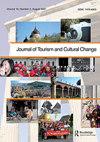母亲在线社区家庭旅行决策中的羊群行为:一种网络学方法
IF 2.5
4区 管理学
Q2 HOSPITALITY, LEISURE, SPORT & TOURISM
引用次数: 1
摘要
母亲是家庭旅行的关键决策者。然而,旅游的不确定性和体验性往往导致妈妈们表现出羊群行为,严重依赖他人的意见,在社会影响下做出相似的决定。本研究对母亲在家庭旅游决策中的网络羊群行为进行了丰富而深入的描述。本文采用网络志定性方法和深度个人访谈法,对韩国一个主要的非商业母亲在线社区中的母亲网络羊群行为进行了观察。在此基础上,本研究提出了一个包含前因和结果的羊群行为理论框架。通过全面了解韩国母亲在家庭旅游决策中表现出的在线羊群行为,本研究也为旅游从业者提供了启示。本文章由计算机程序翻译,如有差异,请以英文原文为准。
Herding behaviors in family travel decision-making in mothers’ online communities: a netnographic approach
ABSTRACT Mothers are crucial decision-makers regarding family travel. However, the uncertain and experience-oriented nature of tourism often drives mothers to display herding behaviors, heavily relying on others’ opinions, and making decisions similar to each other due to social influence. This study offers rich and in-depth descriptions of mothers’ online herding behaviors in their family travel decision-making. The qualitative methods of netnography and in-depth individual interviews were used to observe mothers’ online herding behaviors within one of the major non-commercial online communities for mothers in South Korea. Based on the results, this study introduces a theoretical framework regarding herding behaviors that includes both antecedents and outcomes. This study also provides implications for tourism practitioners based on a comprehensive understanding of the online herding behaviors displayed by South Korean mothers regarding their family travel decision-making.
求助全文
通过发布文献求助,成功后即可免费获取论文全文。
去求助
来源期刊

Journal of Tourism and Cultural Change
HOSPITALITY, LEISURE, SPORT & TOURISM-
CiteScore
5.10
自引率
9.10%
发文量
31
期刊介绍:
Journal of Tourism and Cultural Change ( JTCC ) is a peer-reviewed, transdisciplinary and transnational journal. It focuses on critically examining the relationships, tensions, representations, conflicts and possibilities that exist between tourism/travel and culture/cultures in an increasingly complex global context. JTCC provides a forum for debate against the backdrop of local, regional, national and transnational understandings of identity and difference. Economic restructuring, recognitions of the cultural dimension of biodiversity and sustainable development, contests regarding the positive and negative impact of patterns of tourist behaviour on cultural diversity, and transcultural strivings - all provide an important focus for JTCC . Global capitalism, in its myriad forms engages with multiple ''ways of being'', generating new relationships, re-evaluating existing, and challenging ways of knowing and being. Tourists and the tourism industry continue to find inventive ways to commodify, transform, present/re-present and consume material culture. JTCC seeks to widen and deepen understandings of such changing relationships and stimulate critical debate by: -Adopting a multidisciplinary approach -Encouraging deep and critical approaches to policy and practice -Embracing an inclusive definition of culture -Focusing on the concept, processes and meanings of change -Encouraging trans-national/transcultural perspectives
 求助内容:
求助内容: 应助结果提醒方式:
应助结果提醒方式:


